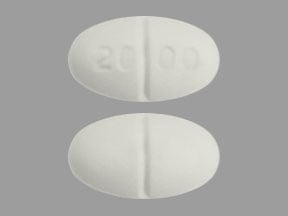
Depen Titratabs Coupons & Savings Card – Discount Prices from $1185.20
Brand for: Penicillamine
This medication is used to treat rheumatoid arthritis, Wilson's disease (a condition in which high levels of copper in the body cause damage to the liver, brain, and other organs), and a certain disorder which causes kidney stones (cystinuria). For the treatment of rheumatoid arthritis, penicillamine is known as a disease-modifying antirheumatic drug (DMARD). It helps to decrease pain/tenderness/swelling in the joints. For the treatment of Wilson's disease, penicillamine binds to copper and helps it to be removed from the body. Decreasing copper levels helps to improve liver function and the mental/mood/nerve problems (such as confusion, difficulty speaking/walking) caused by the disease. For the treatment of cystinuria, penicillamine helps to decrease the amount of a certain substance (cystine) in the urine which can cause kidney stones.
Our Depen Titratabs coupons are free to use. You can print the coupon, email it to yourself, or receive the Depen Titratabs coupon via text message. To get your free discount, show the pharmacist your Depen Titratabs savings card which has the discounted coupon price. Use our filters below to edit the prescription box to match your needs. The Depen Titratabs prices will update based on your prescription needs. Above our Depen Titratabs coupons, you can change the location to see pharmacy prices in other areas. Our prescription discount card will update online with the specific pharmacy costs associated with your edits. Be sure to text, email, or print the Depen Titratabs savings card code that you need after editing the prescription box and location field. Show the discount card to your pharmacist before paying.
My prescription
Edit
250MG, Penicillamine (100 Tablets)
Select pharmacy

CVS
$5480.61
COUPON PRICE
Albertsons
$1185.20
COUPON PRICE
Walgreens
$1451.50
COUPON PRICE
Walmart
$5372.07
COUPON PRICEDepen Titratabs savings card
Show this card to your pharmacist
Albertsons
$1185.20
BIN
ID
PCN
GRP
019876
LHB4622882
CHIPPO
LHX
Powered by
This medication is used to treat rheumatoid arthritis, Wilson's disease (a condition in which high levels of copper in the body cause damage to the liver, brain, and other organs), and a certain disorder which causes kidney stones (cystinuria). For the treatment of rheumatoid arthritis, penicillamine is known as a disease-modifying antirheumatic drug (DMARD). It helps to decrease pain/tenderness/swelling in the joints. For the treatment of Wilson's disease, penicillamine binds to copper and helps it to be removed from the body. Decreasing copper levels helps to improve liver function and the mental/mood/nerve problems (such as confusion, difficulty speaking/walking) caused by the disease. For the treatment of cystinuria, penicillamine helps to decrease the amount of a certain substance (cystine) in the urine which can cause kidney stones.
Our Depen Titratabs coupons are free to use. You can print the coupon, email it to yourself, or receive the Depen Titratabs coupon via text message. To get your free discount, show the pharmacist your Depen Titratabs savings card which has the discounted coupon price. Use our filters below to edit the prescription box to match your needs. The Depen Titratabs prices will update based on your prescription needs. Above our Depen Titratabs coupons, you can change the location to see pharmacy prices in other areas. Our prescription discount card will update online with the specific pharmacy costs associated with your edits. Be sure to text, email, or print the Depen Titratabs savings card code that you need after editing the prescription box and location field. Show the discount card to your pharmacist before paying.
Depen Titratabs FAQs
Using the SaveHealth discount card, what is the price of Depen Titratabs without insurance?
Using the SaveHealth discount card, the price of Depen Titratabs without insurance is $1185.20.
What is the price of Depen Titratabs at CVS?
The price of Depen Titratabs at CVS is $5480.61.
What is the price of Depen Titratabs at Walgreens?
The price of Depen Titratabs at Walgreens is $1451.50.
What is the price of Depen Titratabs at Walmart?
The price of Depen Titratabs at Walmart is $5372.07.
